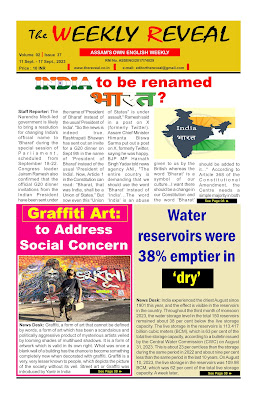TOP NEWS
6/recent/ticker-posts
International Conference begins at USTM
The Reveal
October 10, 2022
Staff Reporter,
Guwahati, October 10: Mahatma Gandhi envisaged and proposed freedom for India through non-violent means, and the power of nonviolence was firmly established by Gandhiji. “Empire, idea, dissolves. And the word state takes its place in which all the states of the world are free and equal. No state has its military. There may be a word police to keep order in the absence of universal belief in nonviolence. India can be a leading unit in the World Federation only through nonviolence”. Quoting Gandhi, this has been stated by Prof. Christian Bartolf, President, Gandhi Information Centre, Berlin, Germany while addressing the inaugural of the 3-day long International Conference on “Redefining Peace towards a Just, Non-violent and Sustainable Future of the world” at the University of Science & Technology Meghalaya (USTM). The conference has been organized by Asia Pacific Peace Research Association (APPRA) in collaboration with Indian Political Science Association (IPSA) and USTM and attended by delegates and participants from across India and several countries, including Germany, South Africa, Indonesia, Ethiopia, Nepal, Bangladesh and Turkey. Delivering the keynote address, Prof. Christian Bartolf said that the concept of sovereignty is linked to the right to warfare. He referred to the role of the United Nations Security Council and deliberated upon the security aspects of countries that are under threat of warfare. The inaugural session of the conference was also addressed by Prof. Prasad Golanapalli, President, Gandhi King Foundation, Hyderabad; Mahbubul Hoque, Chancellor, USTM; Dr. Aslam Khan, Dr. Manish Sharma, Dr. Sri Nuryanti, Co-Secretary General, APPRA, Jakarta, Indonesia and Dr. Leban Serto, Director Centre for Peace Education, Manipur. Speaking as the chief guest, renowned Gandhian scholar Prof. Prasad Golanapalli said that peace will never be meaningful without the basic 3 ingredients: Justice, Non-violence and Sustainable Future. Gandhian peace study is most relevant today because Gandhi's approach to understanding violence is to remove not only the direct forms of violence, but the indirect forms such as poverty, pollution, and corruption must be eliminated. Peace is possible when all human beings are equal, and education is indispensable for promotion of peace, he added. Dr. Leban Serto on the other hand emphasized that Global peace is dependent on local peace, and vice versa. Shri Mahbubul Hoque expressed his gratitude to all the guests and participants of the conference for coming to USTM and sharing their knowledge in the relevant topic of the conference thereby enriching the learning of the student community. The various sessions of the conference would discuss how peace researchers from Asia-Pacific can contribute to understanding and transforming the new conflicts and challenges. The conference aims to explore ways to enhance mutual understanding, dialogue, and collaboration among policy makers, scholars, activists, academia and others with vested interests on the development of bilateral relations, multilateral relations and international relations affected by the current pandemic and several challenging situations. The themes of the conference include: a) Challenges to Peace and Security in Asia-Pacific regions, b) Innovations and Ways of Promoting Peace and Justice, c) Arts, Performance and Creative Methods to Promote Peace, d) Religion, Spirituality and Cultural Consciousness for Peaceful World, e) Climate Justice, Just Transition and Sustainability, f) Protecting People’s Lives/Livelihoods and Issues of Indigenous People, g) Gender and Peace, h) Human Rights During COVID 19, i) Role of Media and Peace Journalism, j) Different dynamics of Refugees and Migrations and Mobilities of People, k) Pandemics and Various Policy Governance Including Health, Economic, Social and Political Policies, l) Changing power dynamics and world order. The inaugural session of the three-day long international conference ended with the vote of thanks delivered by Dr. Md. Nazeer Hussain, local organising secretary, USTM.
Labels
Ads
Side ads
Total Pageviews of the day
Support Independent Journalism
Ads
The Reveal (YouTube)
Popular Posts

Massive Eviction Drive in Gopal Ata Satra
June 10, 2024

Rotary Club of Pune Interacts with DHSK College students
February 25, 2024

Kakopathar AASU submits Memorandum to Tinsukia DC
July 14, 2022
ASSAMESE NEWS
5/Assamese News/post-list
Ads
Random Posts
10/random/post-list
Ads
Ad
Contact Form
Last Ad
Popular Posts

Clarification: Dr. Prafulla Kr. Nath on allegation of Plagiarism
September 07, 2021

Dr. P.K. Nath speaks on the Allegation of Plagiarism against him
September 08, 2021

Tight security in Dhakuakhana on Independence Day
August 09, 2022

Freshmen Social of Dhakuakhana College of Teacher Education (B.Ed) held
September 24, 2022

Dhakuakhana Teachers Training College celebrates teachers day
September 05, 2022

40 bedded ICU to be set up at SMCH
September 08, 2021

CM Dr. Sarma attends conference of ADCs and Circle Officers
September 07, 2021
Crafted with by TemplatesYard | Distributed by Gooyaabi Templates










0 Comments